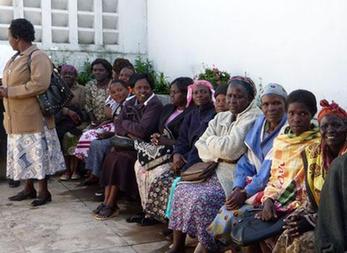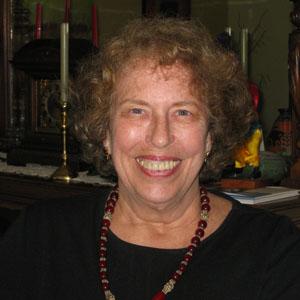
Cervical cancer is the second deadliest cancer - after breast cancer - among women in developing countries. Eight hundred women die of cervical cancer every day, nearly 300,000 each year worldwide.
California gynecologist Kay Taylor is out to change those numbers. She's already saved thousands of women in Latin America, Africa and India.
Six years ago, Kay Taylor gave up a successful medical practice in the San Francisco Bay Area to start the non-profit organization Prevention International: No Cervical Cancer. PINCC, as it is known, operates out of Taylor's house in Oakland, California.
The bedrooms have been converted to office space and her living room is overflowing with medical supplies and equipment.

Today Taylor is getting ready for her next visit to Africa, she and a medical team will visit rural villages in Uganda and Kenya to screen hundreds of women for thehuman papilloma virus. HPV, the most common sexually transmitted disease, has been linked to the development of cervical cancer.
Taylor first realized the magnitude of the problem in 2003 during her first medical visit in Honduras to assist abused women.
"I found three cases of cervical cancer in that two-week visit. I'd seen three cases of cervical cancer in my 25-year practice, so I was stunned". "And I started to do some research and discovered that it is so high in these countries, just as if they hadn't invented the Pap smear, which is what we use to control it here."
By examining cells from a woman's cervix on a Pap smear, HPV infections can be quickly identified and treated. But for most poor women in developing countries, these exams are often inaccessible and unaffordable. Taylor was determined to find a cost-effective way to bring free medical care to these women.
"I remember sitting in my office doing a screening for the abnormal cells and treating this woman and thinking, 'You know, I could put all this equipment in a suitcase and I could take it there and teach doctors and nurses to do this new method that had just been discovered and proven and which allows us to see and treat the condition in one visit.' And that was sort of my 'aha' moment. This wonderful method has now been discovered. It can be used in these countries and taught and doesn't cost a lot of money. Why not go there and teach it?"
On this visit to Kenya two years ago, Taylor taught local doctors and nurses the so-called 'see and treat' technique - screening a woman for HPV, doing a biopsy, and removing cancerous cells - in a single visit to the clinic.
"We go to give training and equipment and establish a sustainable program that will continue to give this service after we're gone. You can't learn this in a few days. I didn't learn it in a few days," she says. "I learned it in a few years as a gynecologist-resident. So it takes time and experience and proctoring. We go back every six months until the groups are well trained, confident and competent."
Nurse practitioner Cheryl Brown is getting final instructions from PINCC staff before leaving for Uganda with Taylor. Like most team members, Brown is a volunteer, who has paid her own way to Latin America for medical site visits. This will be her third trip with PINCC and her first to Africa.
"Many of us, as volunteers, are returnees". "It's so inspirational to be able to see how effective the technique is and how enthusiastic the trainees are about learning the technique and then employing it themselves when we're not there."
Since its first visit to Honduras in 2005, PINCC has expanded its program to seven countries. Taylor and her teams have set up 30 medical sites which screen and treat thousands of women annually.
Six more sites will open in 2012. PINCC volunteers now travel six times a year - to Africa, Latin America, and India - treating an average of 2,500 women.
Taylor estimates that, overall, PINCC has touched the lives of 50,000 women, but she feels the need to do more.
"That's what happens every time I go on one of these trips. I get tired and so on. I'm no youngster. I'm 68 almost". "But every time I go, it stimulates me to want to keep going and come back and open new programs because I see these women whose lives are saved. They could have died if it weren't for us."
Cervical cancer is still far from being conquered. Kay Taylor notes that vaccines are being developed and may become available - and affordable - in 25 years.
And she has another goal where the disease is concerned; she hopes she'll be around to see cervical cancer wiped out for good.
cervical cancer: disease in which the cells of the cervix become abnormal and start to grow uncontrollably, forming tumors 宮頸癌
gynecologist: a physician with specialized training in diseases and conditions of the female reproductive system 婦科醫(yī)生
human papilloma virus (HPV): a virus that causes common warts of the hands and feet, as well as lesions in the genital and vaginal area 人類皰疹病毒
Pap smear: a screening test for precancerous and cancerous cells on the cervix 子宮頸抹片檢查
Child vaccine efforts get big boost
New findings on surgery for women with genes linked to cancer
Experts urge more efforts to fight cancer in poor countries
Screening for breast, cervical cancer: the new advice
(來源:VOA 編輯:張若瓊)
